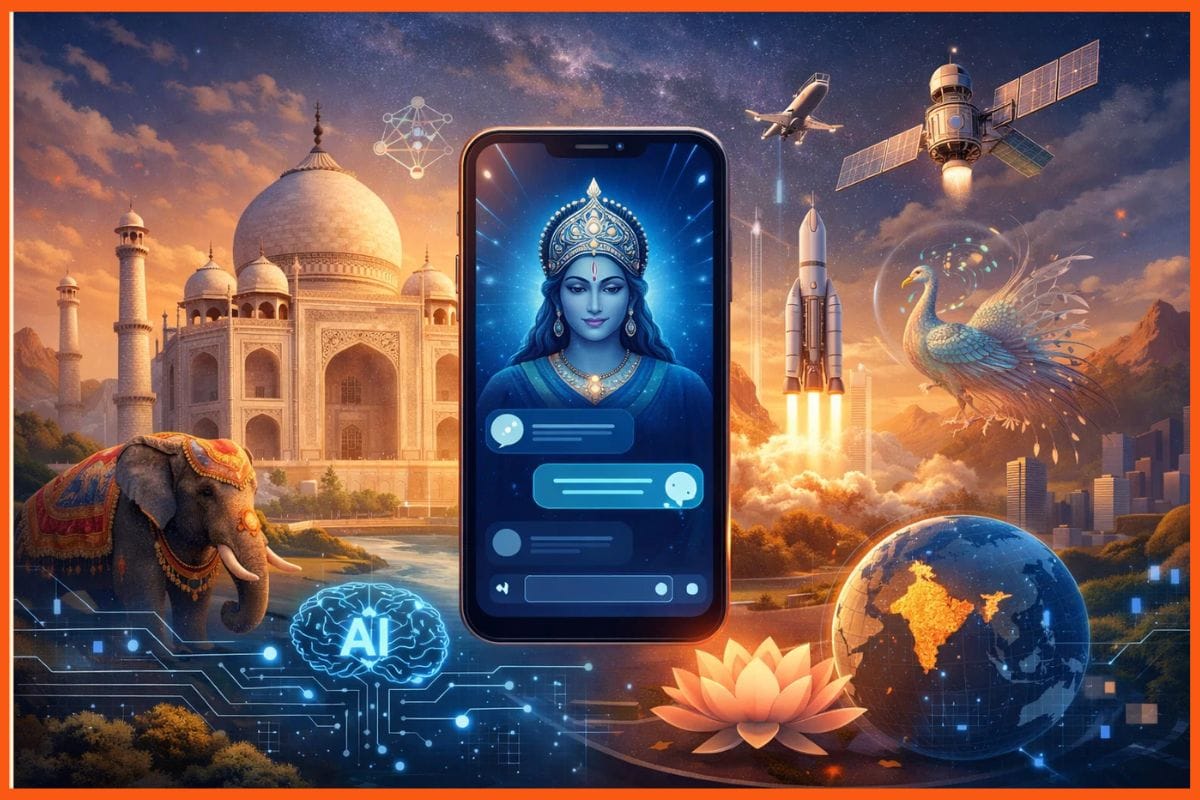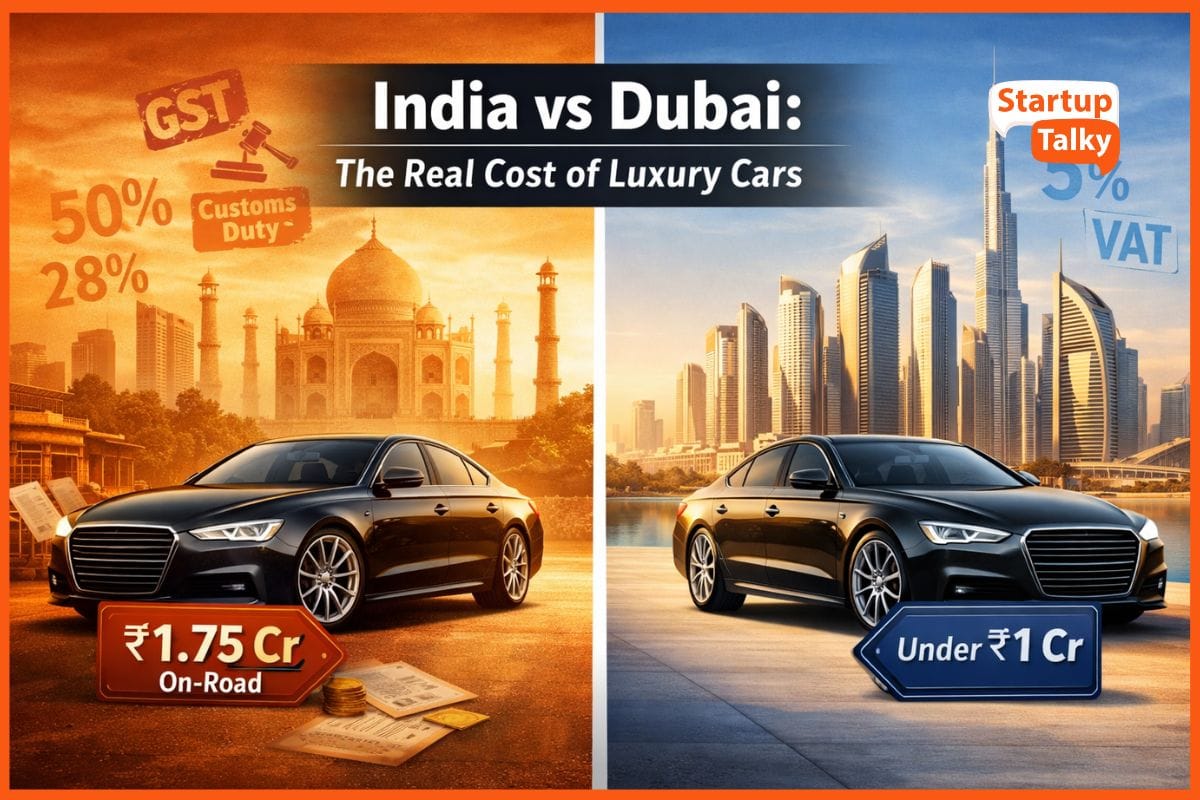Larry Page: A Visionary Mind Behind Google’s Success
👨💻StartupTalkers
Larry Page, the technological luminary who gave shape to the Google revolution, stands as one of the most influential forces in the field. Born on March 26, 1973, he is from Lansing, Michigan location that would come to define much of the new order of the digital world. His interest in computers when a mere child made him turn into the technology giant he eventually became.
A genius in algorithm development, Page co-founded Google in 1998 with Sergey Brin. Page's PageRank development revolutionized how we interact with information on the Internet. However, Larry Page isn't just a tech mogul; he's a forward thinker who is still taking risks, pushing boundaries from his leadership of Google to his brash creation of Alphabet Inc.
In this article, we are going to explore Larry Page's life, which will include early influences, education, career highlights, personal life, education, history, and investments as we try to understand the mind of a true technological innovator.
Larry Page - Biography
| Name | Larry Page |
|---|---|
| Born on | March 26, 1973 (age 51) |
| Birthplace | Lansing, Michigan, US. |
| Education | University of Michigan (BS) Stanford University (MS) Computer Engineer Computer scientist |
| Occupations | Businessman |
| Organizations | Google Alphabet Inc. |
| Known for | Co-founding and creating Google Co-founding Alphabet Inc. Co-creating the PageRank algorithm |
| Spouse | Lucinda Southworth |
| Children | 2 |
| Networth | $159.7 billion (2025) |
Larry Page - Early Life and Education
Larry Page - Career
Larry Page - Personal Life
Larry Page - Investments
Larry Page - Controversies
Larry Page - Awards and Recognition
Larry Page - Interesting Facts
Larry Page - Early Life and Education
Lawrence Edward Page, born on March 26, 1973, in Lansing, Michigan, was born to change the face of the technology and innovation world. Page's environment at an early age led him to create a difference. His father, Carl Victor Page Sr., who taught computer science at Michigan State University, was known as a "pioneer in computer science and artificial intelligence", according to the BBC. His mother, Gloria Page, was equally influential, an instructor in computer programming at Lyman Briggs College.
Page's father's side of the family made him continue in Protestant traditions, but his mother's side came from Jewish heritage, and his maternal grandfather immigrated to Israel. However, Larry's upbringing was not religious. His parents divorced when he was eight, and the situation didn't affect his long relations with his mother and his father's long-term partner, Joyce Wildenthal, who also worked as a professor at MSU.
Introduced by his father to the Exidy Sorcerer computer at age six in 1979, Larry fell in love with technology. He spent an entire lifetime nurtured by those cutting-edge inventions. He learned to use this machine fast so that he didn't just use it for school purposes but as an opportunity to inquire about everything. His older brother, Carl Victor Page Jr., furthered this curiosity by teaching Larry how to take apart and understand household items, creating a mindset of innovation and problem-solving.
Larry could remember his childhood home as a "mess" of creativity, full of technology tools strewn across the rooms. With computers and popular science magazines everywhere, he was in his learning environment. A voracious reader, Larry often sat with books, pouring inspiration that would later define his visionary outlook.
Music was a dimension that had almost the same impact on his upbringing. Larry learned multiple instruments and studied music composition, which he credited for shaping his approach to technology. His time at Interlochen Arts Camp, where he focused on flute and saxophone, instilled an acute awareness of time—a quality he likened to the precision required in computing.
He once noted, “In music, you’re very cognizant of time. Time is the primary thing. That legacy of speed influenced Google.”
Larry's formal education started at Okemos Montessori School in Michigan, where he attended from ages 2 to 7. This nurturing environment encouraged his early love for exploration and creativity. He later graduated from East Lansing High School in 1991. His summers at Interlochen Center for the Arts, where he studied music, further complemented his academic growth.
His undergraduate years were at the University of Michigan, where, in 1995, he graduated in computer engineering with honors. His inventive genius made him first produce a functioning line plotter printer using Lego bricks, then reverse-engineer the contents of some of the proprietary ink cartridges he purchased and invent mechanics to drive them. Through these examples and all his future endeavors, he again shows an ability to put creativity to the service of technical skill.
He was also president of the Eta Kappa Nu honor society and participated in the 1993 University of Michigan Solar Car team, demonstrating his commitment to innovation and sustainable technology. He also made some innovative suggestions, such as replacing the university bus system with a driverless monorail—a very early insight into his interest in automation and efficiency.
Larry then went to Stanford University for his Master of Science in Computer Science in 1998, followed by a PhD. He initiated the research that would forever alter the internet's landscape. Terry Winograd guided his research and was about the mathematical properties of the World Wide Web. During this time, he developed PageRank, which would become the algorithmic backbone of Google.

Larry Page - Career
Larry Page is the visionary co-founder and former CEO of Google and has a career marked by innovation, bold risk-taking, and unrelenting ambition. It all started in 1998 with Sergey Brin when they decided to change the internet by building a search engine that would become the mainstay of the web. The creation of Google, one of the most influential companies in history, began as a university project at Stanford University.
However, Page's leadership style has always challenged the status quo. He was very involved with product development in Google's early days, always pushing the boundaries of what search engines could do. He had a vision that was far greater than mere search improvements; he saw the internet as a vessel to unlock knowledge and connect the world. Google's meteoric rise was founded on its search algorithm Page, and Brin developed PageRank, which presented the most relevant search results based on the web's link structure.
Page’s role changed as the company grew. He spent years working on the technical side of the business and began increasingly getting involved in defining the company's overall strategic direction. When Google was young, Eric Schmidt became CEO in 2001. With Schmidt at the helm, Page and Brin could concentrate on product innovation, and he was excellent at running the company’s operations. Page’s deep technical expertise and relentless drive to innovate made all the difference for Google to become at the top of the tech world.
Page took over Schmidt's position as CEO in 2011. He gave up the position of CEO and took on executive chairman. This marked a new page in the company's history because Page had envisioned the future he wanted the company to reflect. He began by increasing the freedom of the product divisions. Leaders within those divisions were allowed greater independence when making more innovative and feasible decisions. He overhauled the senior management of Google, creating the "L-Team," a team of senior executives who worked closely with him to keep everyone in line. This restructuring, combined with a renewed emphasis on collaboration and communication, paved the way for some of Google's most transformative initiatives.
Under Page's leadership, Google set a path to consolidate its products and services, honing its offerings to create a more cohesive and unified user experience. His work improving designs and user interfaces peaked with "Project Kennedy," a program aimed at rebranding Google's aesthetic identity across all its offerings. This project aimed at making Google's services intuitive, refined, and cohesive, an expression of Page's belief that simplicity and beauty should form the core of the user experience.
Page also launched Google into previously unexplored territory besides software and search innovations. He headed the company's acquisition strategy, which focused on firms that could bring about transformative change in society. The most notable acquisition was in 2011 with Motorola Mobility, secured due to the necessity to obtain patents to keep Android safe from lawsuits by competitors like Apple and Microsoft. Although Page sold Motorola in 2014 at a loss, his vision for acquiring and nurturing new technologies allowed Google to maintain its position as a leader in the tech industry.

Page's vision went beyond traditional technology. He overhauled the senior management of Google, forming the 'L Team' — a group of senior executives who worked with him to keep everyone in line. It marked the beginning of some of Google's most transformative initiatives, and it did so by restructuring under the banner of collaboration and communication.
Under Page’s leadership, Google proceeded to consolidate and simplify its products and services, building a more cohesive and unified user experience.
In 2013, he created Calico, his research and development initiative to help fight aging and improve human health. This biotechnology was Page's more general vision: to address hard, difficult problems—problems that have the potential to improve people’s lives across the planet. Additionally, he has invested in companies like Tesla Motors and Kitty Hawk to help create the future of energy, transportation, and space exploration.
In 2015, Page conceived the idea of restructuring Google into Alphabet Inc., the parent company that would separate the core internet businesses from its more risky ventures. He was replaced as Google CEO by Sundar Pichai, and Page was made CEO of Alphabet, focusing on the vision and more high-risk ventures, while Pichai was allowed to run Google day to day. Page's decision to step down as Google CEO was a smart move and many people thought it would be a good idea to keep control of the company while taking on the next technological wave.
Although Page stepped down as CEO of Google in 2019, his presence remains strong at Google and Alphabet. His legacy is one of unyielding innovation and a bold, forward-looking vision for technology. He didn’t settle for incremental progress; he always wanted breakthrough progressions that would transform the world.

Larry Page - Personal Life
Larry Page's personal life reflects a nice mix of personal passions, deep-rooted family commitment, and passion for innovation, with very strong elements toward sustainability and philanthropy. Like his professional endeavors, his personal path is marked by some important events, family commitments, and investments that shape not only his legacy but also his life.
In the early 2000s, Page's personal life collided with his professional one when he briefly dated Marissa Mayer, a Google employee and later the CEO of Yahoo! This was an interesting collision of two of the brightest minds in the tech industry. However, Page's romantic life had increasingly gravitated around long-term partner Lucinda Southworth, whom he married in 2007.
Page and Southworth's wedding was celebrated on Necker Island, a luxury Caribbean island owned by Richard Branson, highlighting their connection's celebrity status. Lucinda Southworth, who comes from a respected research scientist background, is also the sister of American actress and model Carrie Southworth. Page and Southworth have also started a family, with two children born in 2009 and 2011, making Page an even more devoted family man.
In 2005, he bought the historic Pedro de Lemos House in Palo Alto, California, a 9,000-square-foot Spanish Colonial Revival residence designed by Pedro Joseph de Lemos, a polymath and founder of the Carmel Art Institute. The house was constructed between 1931 and 1941.
In 2009, he started buying the surrounding lands to construct an enormous eco-friendly house. The properties he bought were carefully deconstructed, and the materials used were reused to show his dedication to environmental sustainability.
Apart from his residential deals, Page also had a penchant for the unusual. In 2011, he bought a 193-foot superyacht named Senses for $45 million. The yacht was another testament to Page's love for discovery and adventure with a touch of luxury.
In 2013, he shared on his Google+ profile that his vocal cords were paralyzed due to an autoimmune condition called Hashimoto's thyroiditis, which had been affecting his ability to speak normally. Yet, Page continued to lead with determination despite the challenges. He donated more than $20 million to vocal cord nerve function research at the Voice Health Institute in Boston, and his commitment to finding a cure was evident in his continued interest in scientific progress.
In 2014, through his family foundation, Carl Victor Page Memorial Fund, Page donated $15 million to fight the Ebola virus epidemic in West Africa. His generosity demonstrates a belief in using his wealth and resources to better the world against pressing global issues.
In 2021, reports indicated that Page had a resident's visa to New Zealand, and the family had to move to this country during the COVID-19 crisis since they had been staying in Fiji. Thus, this signified Page's desire to live in peace and away from public scrutiny, focusing on how his family has been doing with the situation.
He has bought several islands in the Caribbean and South Pacific. Some of his most recent purchases include Hans Lollik Island in 2014, Eustatia Island, Cayo Norte in 2018, and Tavarua in 2020. These properties are examples of his preference for the unique, secluded, and pristine, and give a glimpse into the lifestyle of one of the world's most influential tech moguls.

Larry Page - Investments
Larry Page is one of Google's founders. He has invested strategically in many industries to reflect his interest in innovation, technology, and space exploration. His investment portfolio consists of a few pioneering companies that advance the limits of what is achievable in their respective domains.
| Announced Date | Organisation Name |
|---|---|
| Jun 9, 2016 | Kitty Hawk |
| May 26, 2016 | Planetary Resources |
| Apr 21, 2015 | Twigtale |
| Sep 1, 2012 | Planetary Resources |
| May 1, 2006 | Tesla |
Larry Page - Controversies
Larry Page has been involved in various controversies lately and so receives attention for his pathbreaking contributions to technological advancement and his association with grave legal and ethical concerns.
For instance, most recently, the US Virgin Islands government faced problems in serving a subpoena to Page in its civil suit against JPMorgan Chase. The suit claims that the bank is equally responsible for what had happened by being complicit in sex trafficking through one of its long-time clients, convicted sex offender Jeffrey Epstein. All documents from Page referring to the communications he made with Epstein and JPMorgan are subpoenaed about information concerning Epstein's role in human trafficking and soliciting women to engage in commercial sex. Despite the many attempts by the US Virgin Islands to comply with the subpoena, Page has managed to avoid any action against him in court thus far. Even the government had sought leave of the Manhattan federal court to permit alternative service through the mail or other public means. Such a prolonged battle in the courtroom brings significant questions about Page's relationship with Epstein and JPMorgan and challenges his claims within the tech space.
Further intensifying the ongoing controversy, Page’s associations with the ultra-wealthy and privileged lifestyle have ignited discussions regarding access and influence. In early 2021, during the global pandemic, Page was permitted to enter New Zealand under exceptional circumstances to accompany his ailing son, who necessitated urgent medical attention. His entry provoked scrutiny, as it was authorized through a special visa program designated for individuals prepared to invest millions into the country. Critics say this only shows that the rich have disproportionate access to privileges that others can only dream of, especially at a time when most borders were closed to foreign visitors.
Larry Page's involvement in these long-standing controversies paints a disturbing narrative about the complexities surrounding his wealth and power. From legal entanglements surrounding Epstein's sex trafficking operations to questions of his preferential treatment as a billionaire in New Zealand, Page's reputation remains under intense scrutiny. While he might have been an integral part of forming one of the most influential companies in history, his actions and associations continue to spark intense debate over the responsibilities that come with significant power and wealth.
Larry Page - Awards and Recognition
Larry Page is the co-founder of Google and a visionary leader. He is known worldwide for his important work in technology and new ideas. His awards show his strong character and a major influence on the digital age.
- 1998: PC Magazine named Google one of the Top 100 Websites and Search Engines, starting its rise to power in the tech industry.
- 1999: Google won the Technical Excellence Award for Innovation in Web Application Development, establishing its technical prowess.
- 2000: The search engine won a Webby Award and a People's Voice Award that further cemented its position as a revolutionary force in technology.
- 2001: Google won all the Search Engine Watch Awards. These included Outstanding Search Service, Best Image Search Engine, Best Design, etc.
- 2002: The World Economic Forum named Page a Global Leader for Tomorrow, recognizing his forward-thinking leadership.
- 2003: Page, along with Sergey Brin, received an honorary MBA from IE Business School, honoring their entrepreneurial spirit and innovation.
- 2004: Fundamentally changing how information is retrieved warranted them being awarded the prestigious Marconi Foundation Prize and inducted as Fellows at Columbia University. The same year, they received the Golden Plate Award from the American Academy of Achievement.
- 2005: Page and Brin were elected Fellows of the American Academy of Arts and Sciences and the world's most influential thinkers.
- 2008: Google was represented by Page, who won the Communication Award at the Prince of Asturias Awards.
- 2009: He was awarded an honorary doctorate by the University of Michigan during its graduation commencement ceremony.
- 2011: He was the 24th richest billionaire in the world and the 11th richest person in the US, according to Forbes.
- 2014: Fortune Magazine named Page "Businessperson of the Year," calling him "the world’s most daring CEO." The Bloomberg Billionaires Index listed him as the 17th richest person in the world that same year, with a net worth of $32.7 billion.
- 2015: Voted by Google employees, Page became the #1 Chief Executive in Forbes’ "America's Most Popular Chief Executives" list.
- 2017: The city of Agrigento, Italy, granted Page honorary citizenship, crediting him with making a global impact and contribution.
Larry Page - Interesting Facts
- Larry Page had a very insatiable thirst for technology from a young age. His interest in the technology industry grew when he grew up in a family of computer science professors and developed a program to help his parents organize their files, a precursor to his future role as a pioneer in the technology industry.
- Page co-founded Google in 1998 with Sergey Brin, who was continuing his pursuit of a Ph.D. at Stanford University.
- With the PageRank algorithm, the internet changed the face of the internet by rating web pages based on how many and how good the links are.
- Page became CEO of Google at the ridiculously young age of 25 and steered the company through one of technology’s most successful initial public offerings in 2004. At that juncture, leadership was vital in securing Google as the most powerful name in the new digital age.
- In 2015, Page and Brin took it one step further by setting up Alphabet Inc., a parent company that includes Google and many other ventures. It allowed them to focus on new frontiers of technology while remaining in the lead in search and advertising.
- Page's efforts to solve the world's most complex problems extend far beyond the scope of a search engine. Through his leadership, Google has pursued projects in self-driving cars (Waymo), life sciences (Verily), and renewable energy, with each project exemplifying his drive to push the boundaries of technology for the greater good.
- Page bases his approach on believing that technology can help change the world. His philosophy is centered around setting ambitious goals and harnessing the power of technology to tackle the most pressing problems in society; this is exactly what has fueled Google's success and drives his private ventures.
- The page was criticized concerning the data collection done by Google, which was associated with issues about privacy. Still, he maintained support for the practices undertaken by the firm, stating that it was committed to offering specific services that met users' needs, underlining his commitment to innovation even amidst controversy.
- A relatively private individual, Page is a passionate aviator, possessing a license that exemplifies his enthusiasm for flying. His personal life reflects his professional endeavors—driven by an unwavering commitment to innovation. Page fosters an environment of experimentation and risk-taking at Google, promoting daring ideas and forward-thinking concepts.
Conclusion
Larry Page's contributions to the internet are invaluable. Together with Sergey Brin, his hard work and smart strategies built Google into a global powerhouse. Without Google, life wouldn’t be as simple and convenient as it is today.
FAQs
Who is Larry Page?
Larry Page is a co-founder of Google, created with Sergey Brin in 1998. He developed its search engine and later became CEO of Google and Alphabet Inc., transforming online information access.
What is Larry Page net worth?
Larry Page's net worth is $159.7 billion as of January 2025.
What is Google founder, Larry Page age?
Larry Page was born on March 26, 1973. He is 51 years old.
Who is Google founder?
Google was founded by Larry Page and Sergey Brin in 1998.
Who is the owner of Google?
Google is owned by Alphabet Inc., its parent company. Alphabet's largest shareholders include its co-founders, Larry Page and Sergey Brin, along with other investors.
What is Larry Page education?
Larry Page studied Computer Engineering at the University of Michigan for his bachelor's degree. He then pursued a Master’s and PhD in Computer Science at Stanford University, where he met Sergey Brin and started Google.
When was Google founded?
Google was founded on September 4, 1998, by Larry Page and Sergey Brin while they were PhD students at Stanford University.
Must have tools for startups - Recommended by StartupTalky
- Convert Visitors into Leads- SeizeLead
- Website Builder SquareSpace
- Run your business Smoothly Systeme.io
- Stock Images Shutterstock







